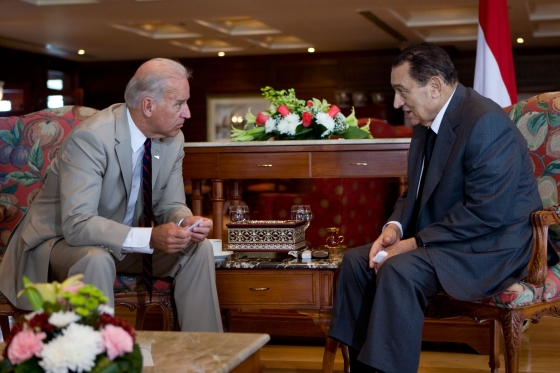Biden: Mubarak Not A Dictator, But He Needs to Listen To His People
As the protests rage in Egypt, the United States is walking a tightrope:
In an interview with the Newshour’s Jim Lehrer today, Vice President Biden said he would not refer to Egyptian President Mubarak as a dictator and instead called him an “ally” on a number of key foreign policy issues.
When asked if it was time for Mubarak to stand aside, Biden said no.
“I think the time has come for President Mubarak to begin to move in the direction that – to be more responsive to some of the – some – some of the needs of the people out there,” Biden said.
Biden said the people protesting are “middle-class folks” who are looking for more opportunity.
“Violence isn’t appropriate and people have a right to protest,” he said, adding that he hopes Mubarak will “respond to some of the legitimate concerns that are being raised.”
“Mubarak has been an ally of ours in a number of things. And he’s been very responsible on, relative to geopolitical interest in the region, the Middle East peace efforts; the actions Egypt has taken relative to normalizing relationship with Israel,” the vice president said. “And I think that it would be – I would not refer to him as a dictator.”
Biden stressed repeatedly that when it comes to Egypt and Tunisia, the United States urges all parties to resolve concerns and differences
Video:
Attention will be paid to Biden’s insistence that Mubarak is not a dictator, but the truth is that the U.S. is in a difficult position here. We’ve spent three decades propping up the Mubarak regime, and if he leaves the only alternatives seem to be a military coup or democracy, which could mean a far more Islamist Egypt. Neither one of these options is entirely palatable.







What more evidence is needed to conclude there is little difference in neo-liberal and neo-conservative ideology? Both parties have a virtually identical view of the world and America’s role in it; a world where dictators subservient to our interests aren’t really dictators, while those resistant or opposed to our imperial pursuits are labelled threats to to global peace.
For our vice president to claim Hosni Mubarak is not a dictator is literally criminal. We have aided and abetted numerous human rights violations under the Mubarak regime, seen political activists jailed, tortured and murdered. We have turned a blind eye to rigged elections and systematic subversion so as to consolidate the rule of an American client. Joe Biden responds by essentially stating the people who have bled and suffered at the hands of that client either do not exist or have no legitimate grievance.
How much more shame must this country endure at the hands of its elected leaders?
I think this paragraph is remarkably honest:
He’s saying Mubarak has been useful as we pursue what we think are good things (a peace process?), and for that reason he isn’t ready to call him a dictator.
That’s realpolitik.
What’s the alternative, to help bury allies? And if something worse comes after, what is your responsibility?
“And if something worse comes after, what is your responsibility?”
I would argue we shouldn’t be in a position to be responsible at all. To my knowledge Egypt has not been admitted to the Union, and whether Egypt’s transition will be for good or ill is not our rightful concern. I also question the belief in American capacity to wisely pick winners and losers on the international stage. To think that we can better choose Egypt’s path than its people can is the worst form of arrogamce.
Biden’s quote isn’t realpolitik, it’s the world turned upside down. The term “dictator” is not dependent upon whether a tyrant supports U.S. policy. Whether he has cooperated in the peace process is irrelevant to how his government behaves domestically.
That Joe Biden has to twist and qualify the facts to maintain the illusion of American commitment to peace and democracy should provide ample evidence of our moral and ethical bankruptcy.
Many words Ben, but isn’t it simply true that Mubarak’s Egypt has been a strategic partner?
Misleading headline.
Biden didn’t claim Mubarak was not a dictator. He said that he would not refer to him as a dictator. That’s more like diplomatic weasel-talk than a factual claim about Mubarak. It’s like when someone asks you a pointed question about a co-worker or your boss and you say, “I wouldn’t refer to him as an idiot”.
“Many words Ben, but isn’t it simply true that Mubarak’s Egypt has been a strategic partner?”
Let me make it less long-winded, then. We’re meddlesome. It’s time to bring back the foreign policy school known as Realism and allow other peoples to determine their own fates. Mubarak serves us, but his people hate him, and by extension hate us for enabling him. Surely the legacies of Vietnam and Iran should teach us our policy of propping up dictators is ultimately self-defeating.
Mubarak. No he’s not a dictator.
He just has a really, really bitchin’ re-election committee working for him.